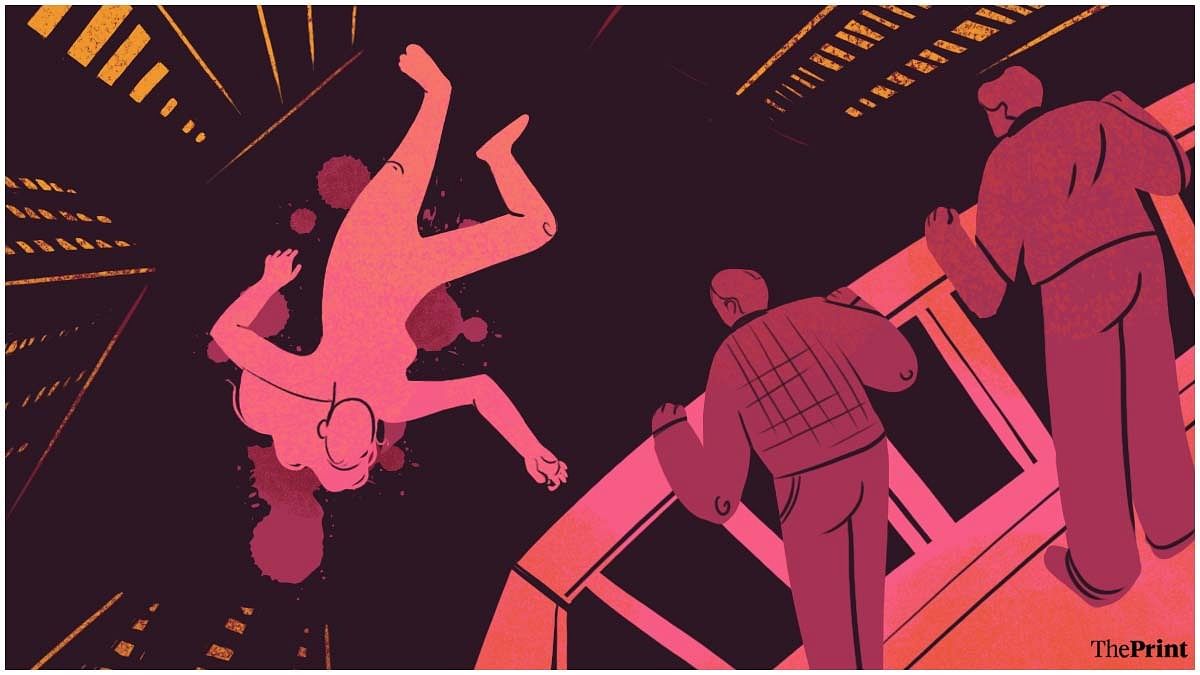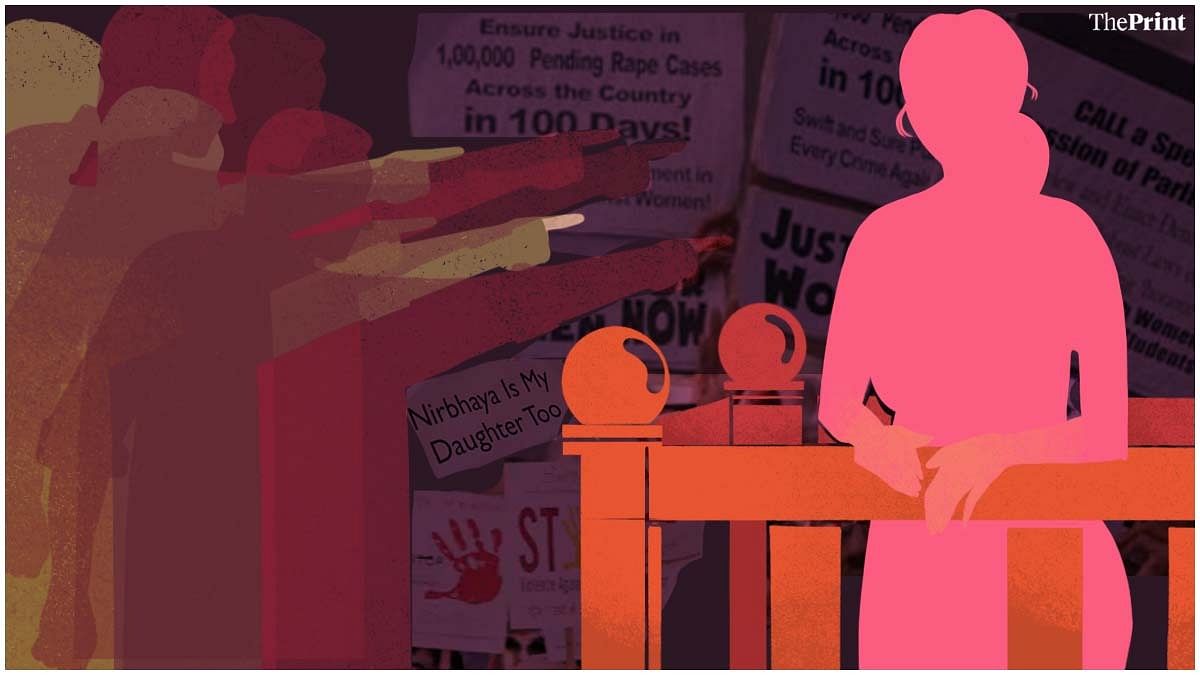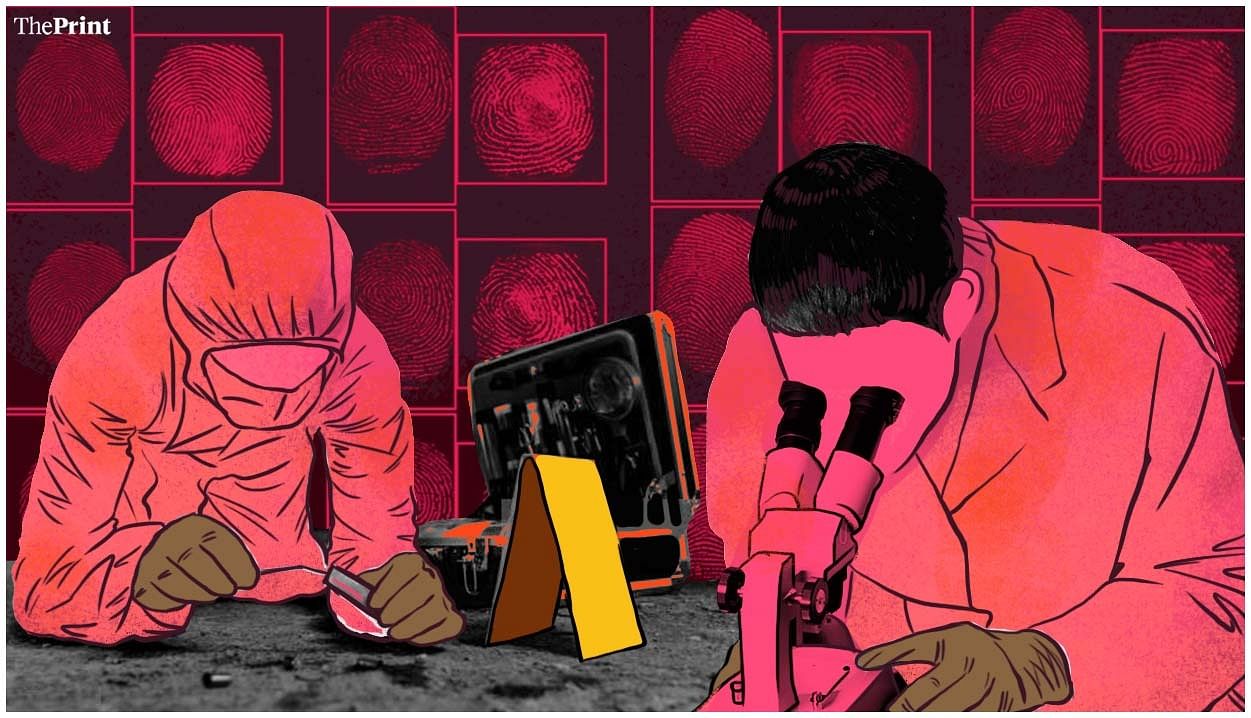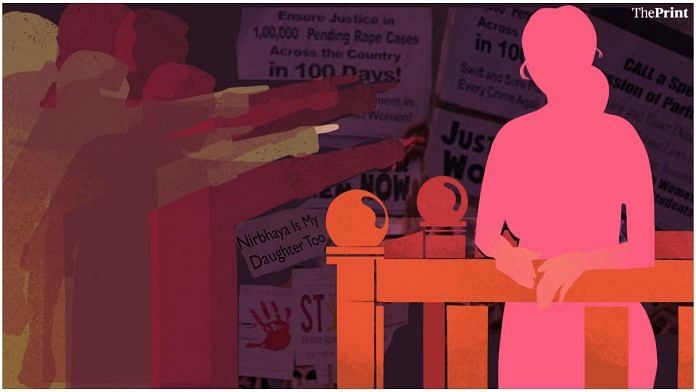EARN EXTRA INCOME. Work from home part/full time. Get training & all solutions from US Based 7.8 Billion MNC…Only if you are Ambitious and Serious Call 96433XXXX…One call can change your life.”
Nisha was working in a preschool close to her house in Delhi’s Rohini district, getting paid only Rs 6,000 a month. With three sisters married off, a young brother and an ill mother at home, the 19-year-old — the only earning member in her family — was looking for a way out. And so, when someone gave her the card with a number that promised to change her life, Nisha made the call.
Nisha’s life did change, but in the most unimaginable way.
On 16 January 2019, ten days after joining her new workplace, a company selling herbal products, Nisha did not return home. As her family and relatives flitted from one police station to another, Nisha lay confined in a three-storey building in Karol Bagh, being gang raped by a group of men. On 17 January, she was found severely injured after falling off the building. A PCR call was made and she was taken to a hospital in South Delhi. Three days later, on 20 January, she succumbed to her injuries.

Nisha’s case, like of many other rape survivors and victims, followed a similar trail since her abduction — a missing complaint registered 16 hours later, family protest against police negligence and apathy, FIR registered on the day she died, and a chargesheet that uses the word “sex” extensively instead of “rape”.
This was 2019, seven years after the 2012 gang rape and murder of a 22-year-old physiotherapy student in a moving bus in Delhi. The roaring nationwide protests that followed led to a major, long overdue overhaul of India’s criminal law, and introduced the novel concept of a ‘zero FIR’ — survivors could approach any police station in the country and have an FIR registered, disempowering police officers from turning them away on the ground of ‘jurisdiction’.
But the amendments, more or less, are decorative aspects of the law, rarely coming out of the paper. Women across the country are left to fight a hostile justice system, from the moment they step into a police station. Justice, for women like Nisha, remains a long shot. From lapses in filing timely missing complaints to contamination of forensic evidence and delay in gathering forensic reports to intimidation of survivors and victims’ families in courts — the criminal justice system, it would seem, puts the survivors on trial.
Also read: Gangraped in teens, visiting courts as grandmothers: 1992 Ajmer horror is an open wound
Getting an FIR registered is a big ask
For Nisha and her family, their nearest police station, Kanjhawala, should have held out hope, a lot more than the city or country’s police system has to offer. Kanjhawala bagged the ‘best police station’ award in Delhi this February.
Around 1 am on 17 January, personnel from the Kanjhawala police station visited Nisha’s family and told them to go to Madipur, Nisha’s place of work, to register a complaint.
“I told them it won’t be possible to leave my mother alone in the house,” Nisha’s brother said.
Notably, the Kanjhawala police didn’t make a general or daily diary entry, which is done on receipt of any complaint before an FIR is registered, and is considered crucial during probe and in court.
Around 10 am the following day, the family went to Madipur police station and was taken to Connaught Place — where Nisha was allegedly sent by her employers for a meeting. A missing person report was finally registered around 4.50 pm.
“We had to protest to make the police take us seriously. They weren’t investigating the case and also wouldn’t tell us anything,” the brother said.
It was only on the day of Nisha’s death that an FIR was lodged at Prasad Nagar police station in Karol Bagh where she was found. The FIR registered under IPC section 308 (attempt to commit culpable homicide) was later changed to section 306 (abetment to suicide) after news came she had died.
“We had doubts that there was something wrong done to the girl. She had bite marks on her hand. We kept asking the police but they didn’t answer except that she had committed suicide by jumping off the building,” said Chandan Kumar, the pradhan of Nisha’s locality.
While five accused were arrested on 24 January, according to Kumar, the family was informed only on 28 January, after multiple trips to the police station.
According to the chargesheet, all five accused, including a juvenile — Nisha’s primary contact person — have been charged for gang rape, abetment to suicide, and kidnapping. Post the forensic report, a supplementary chargesheet was also filed. Barring the juvenile, all the other accused, including the woman who allegedly gave shelter, are behind bars.
Also read: ‘Will you marry her?’ — CJI Bobde asks govt servant accused of repeatedly raping minor
‘Lost her life due to police negligence’
Ever since the 2012 Delhi gang rape, commonly known as ‘Nirbhaya case’, the Indian police have drawn flak time and again over delay in lodging an FIR, more often squabbling over jurisdiction. The Justice Verma Committee, set up to bring in reforms in the criminal justice system after the Nirbhaya case, had in its 2013 report first suggested the concept of ‘zero FIR’.
Six years after it was introduced, in late November 2019, Hyderabad-based family of a veterinarian ‘Disha’ was being made to run from pillar to post by the police, which kept citing jurisdiction the night before her charred body was found on the Hyderabad-Bengaluru national highway. The delay in taking cognisance leads to a delay in investigation and search for the victim, with the police wrangling over jurisdiction losing crucial time. Three police officers were suspended over dereliction of duty, for delay in filing the missing complaint.
However, in Nisha’s case, the family had to knock on several doors before any action could be taken against the police officers. They wrote letters through an NGO to Delhi Commission for Women (DCW) and Social Action Forum for Manav Adhikar, alleging misconduct, negligence and delayed action. The complaint finally made its way to the National Human Rights Commission (NHRC) on 13 February 2019.
A preliminary inquiry was initiated and the officers were shifted to non-sensitive postings or transferred to non-sensitive units. However, an ACP-led inquiry let three of them off early last year with a written warning, describing the officers’ failure to make the daily diary entry a “minor lapse”.
But the NHRC still blamed the authorities. It found that “due to negligence of police officials, [the] victim lost her life” and ordered the Commissioner of Police, Delhi to pay a compensation of Rs 3 lakh to Nisha’s family, in addition to the Rs 50,000 that had already been paid.
“Had police taken the effective steps immediately to search the victim at expected places, the life of the victim could have been saved,” the NHRC report said.
Also read: SC quashes rape case after marriage but leaves important legal questions unanswered
‘As if she is the cause of the crime’
The Criminal Law (Amendment) Act 2013 amended several provisions of the Indian Penal Code, Indian Evidence Act, and the Criminal Procedure Code to prevent incidents exactly like these. But, almost every visit by the survivor or victim’s family to a police station is nothing less than a hassle. In the words of the Supreme Court, “the police, more often than not, question the victim like an accused.”
“If the victim is a young girl who has been dating and going around with a boy, she is asked in intimidating terms as to why she was dating a boy. The victim’s first brush with justice is an unpleasant one where she is made to feel that she is at fault; she is the cause of the crime,” the court said in a 2018 judgment.
Even in Disha’s case, when her family had first approached the police to file a missing person complaint, they were asked if she had a boyfriend — suggesting that she had eloped with him.
In the 2018 Rewari gang rape case, the officer-in-charge at the police station also subjected the victim to statements like why she wanted to “blame the young boys”.
“They delayed lodging the FIR, and were instead busy questioning my daughter,” her mother said.
The National Crime Records Bureau (NCRB) reported a slight drop in the number of rape cases in 2020 — from 32,033 cases in 2019 to 28,046. However, this still meant that the year of pandemic and nationwide lockdown saw an average of 77 rape cases every day.
Although the NCRB report did show an increase in conviction rate — from 27.8 percent in 2019 to 39.3 percent in 2020 — this is abysmally low when compared with the fact that the chargesheet rate remains at 82.2 percent. So, while the police file chargesheet in 82 out of 100 cases, only 39 out of 100 cases end up in a conviction.
“Justice for families of rape victims and rape survivors is still a far-fetched dream because even if the trial court has given the order, it gets stuck in the higher courts due to botched up police investigations. This starts from the initial level — field officers collecting evidence aren’t trained, SOPs not followed. More often, officers don’t even seal the crime spot immediately which again leads to tampering of forensic evidence,” Yogita Bhayana, social activist and founder of PARI (People Against Rapes in India), said.
Also read: UP Police neglected woman’s use of ‘zabardasti’, ‘chhedkhani’ — CBI in Hathras charge sheet
In a Jaipur police station, thinking of ‘Pink’
“No means no.” Amitabh Bachchan repeating this line in his thunderous baritone voice in the 2016 Bollywood movie ‘Pink’ helped start a crucial conversation around consent. But more than that, the film told many people about the ‘zero FIR’. So when Swati (*name changed on request) stood inside the Jaipur police station hours after being raped thrice on a cold February night in 2017 and violently thrashed by someone she had known for nearly two years, her mind raced back to what this movie had taught her.
Swati said the police officers initially told her to go to the city where she was raped — in Chittorgarh district in southern Rajasthan – to register the FIR. But she stood her ground for hours.
“All I could think about was that something very wrong had happened with me…I had never dealt with court kachehri before, but at that time, movies like Pink kept playing in my head. I knew that a zero FIR could be filed so I went to the police station with two friends, the scars from being thrashed visible on my face and my body,” Swati said.
She said she had to call her friends from an NGO to finally get the zero FIR registered.
As per Swati’s complaint, one Rishabh Singh, whom she had known for nearly two years, raped her thrice and thrashed her on the intervening night of 24 and 25 February 2017.
Swati holds a postgraduate degree from one of the premier institutes in India, and was working in the development sector back then. She was visiting the city in Chittorgarh as she had done before along with her friends. That night, Rishabh allegedly raped her. When she resisted, he threatened her by saying he had a gun.
Her chat history from that night shows frantic messages to a friend, saying, “He has pistol wid him”, “Don’t ping n call him”, “If u vl, he will kill me”, “I hv to get out of here (sic).”
Swati claims that she managed to regain his trust and leave early the next morning. She made her way to Jaipur to her friend’s place and together they went to the police station.
“Of course, I realised later that what they show in the movies is only part of it. Nobody shows the sort of tension and fear that we and our families go through, every minute, every second of the day,” she said.
Also read: Staying silent at rape jokes is never the answer. Leads to rapists thinking they can get away
‘Multiple boyfriends, drugs’
For women, trauma in cases of sexual violence takes new forms after the crime. And the country’s justice system plays a huge role in it. Women continue be put on trial themselves, with judges often rolling up their sleeves to minutely examine their lifestyle and sexual experiences to form an opinion on their allegations.
When Rishabh was arrested in the first week of April, a month after the FIR was registered, he was granted bail within days, on 11 April 2017, by a court order that said — the “available photographs show that she has multiple boyfriends and is also used to doing drugs”. As per the order, Rishabh had submitted “photos and videos of her being intoxicated.”
The order, which was later upheld by the Rajasthan High Court, also gave weightage to the fact that Swati had gone “voluntarily” to Chittorgarh to meet Rishabh, that she had known him for years and that they used to “chat all night long”.
A September 2017 order passed by the Punjab and Haryana High Court granted bail to three men convicted in May that year for repeatedly gang raping and criminally intimidating a fellow university student. The court even suspended their 20-year sentence, making several references to “promiscuity”, “adventurism”, and “experimentation in sexual encounters” of the victim. Her statement, it said, “offers an alternate conclusion of misadventure stemming from a promiscuous attitude and a voyeuristic mind”.

The Supreme Court had to step in and cancel their bail.
In August 2021, the Gauhati High Court granted bail to an Indian Institute of Technology (IIT) Guwahati student, Utsav Kadam, accused of raping a fellow student, observing that the accused, as well as the survivor, are both “state’s future assets”. The order was passed after noting that there was a “clear prima facie” case against Kadam.
Swati said she didn’t even know that Rishabh had been granted bail, until a few days later.
A 2018 amendment did attempt to change this. It made it compulsory for the informant or any person authorised by the survivor/victim to be mandatorily present at the time of hearing of a bail application in a rape case. But the ground reality is still the same as before, with the Delhi High Court noting in June 2020 that survivors in sexual assault cases were still not being informed by the courts while hearing bail applications in a majority of cases.
Also read: Rewari gang rape is a reminder of Haryana’s toxic mix of patriarchy and porn
‘I will continue fighting’
Swati’s ordeal did not end in Chittorgarh. The next two years, she said, were the worst. While her mother was diagnosed with breast cancer, she continued to attend court hearings.
“When I entered the courtroom, Rishabh came and sat right in front of me and kept staring at me. I got really scared again, began panicking and almost fainted…And this kept happening during the hearings. He always lingered around us in the courtroom,” she said.
Swati then wrote letters and emails to the Supreme Court and the Rajasthan High Court complaining about this. While she says she didn’t receive any response, the situation did get better and Rishabh was then made to stand in another corner of the courtroom.
She also wrote multiple letters alleging that Rishabh had been trying to threaten her and other witnesses.
Rape victims are often faced with intimidation within the courtrooms, with the man’s trial often turning into the victim’s tribulations. Mindful of this, the Supreme Court had in 2017 asked high courts across the country to set up a vulnerable witness deposition centre (VWDC) in every high court and judicial district court. These centres are meant to provide an intimidation-free and friendly atmosphere for vulnerable witnesses. However, as per a report, 9 out of 25 high courts in India have still not established the centres on their own premises and many district courts continue to be without them too.
While in Delhi, which had a VHDC way back in 2012, vulnerable witnesses initially only included minors, the Supreme Court expanded the definition in January 2022 to include all victims of sexual assault, among others.
Swati lost her mother to breast cancer last year, but she is ready to fight alone.
“She died fighting with me, she used to be extremely stressed…The society makes things tougher, asking questions like who will marry her now. Before dying, she asked me to not stop fighting, she told me that I have to continue fighting this and I will,” Swati said.
Also read: When patriarchy meets smartphone pornography: Why tiny Haryana is India’s rape capital
From Nikka Singh to Hathras
In any rape trial, the victim’s medical examination and forensic evidence can often make or break the case. It is often used not only to establish rape, but also to identify the perpetrator, if any DNA evidence is found. However, such evidence is often found lacking in trials, for issues ranging from delay in sending samples to the laboratory to the time within which the country’s limited forensic resources finally come back with a report.
Take a 2013 Punjab and Haryana judgment, for example, which acquitted a death row convict, Nikka Singh, while noting that there wasn’t enough evidence that he raped and murdered his 75-year-old bua (father’s sister). Among the evidence were two vaginal swabs on cotton wool, not sticks, which is the usual practice, and one of the cotton swabs apparently had a “fungus like material” which the court attributed to delay in sending it for examination.
As per the judgment, two small bottles containing the swabs gathered dust in the malkhana for nearly a month before the police sent them to the forensic science laboratory.
This doesn’t seem to have changed over the years. In the alleged gang rape and murder of a 20-year-old Dalit woman in Uttar Pradesh’s Hathras, the FSL report used samples – from her hair, clothes, nails, bed, vagina and anus — that were collected from her eight days after the crime and were sent for forensics 11 days after the attack. Naturally, the FSL report ruled out rape and the Uttar Pradesh police relied on this report to claim that she was not raped.

Experts, however, have since explained that this report “holds no value” because of the delay in collecting samples. Government guidelines also state that medical evidence shouldn’t be collected if the assault is reported 96 hours after the incident, because the FSL report cannot conclusively prove rape then. This is because the presence of semen, including other evidence, might get removed after the 96-hour time frame.
Samples in Nisha’s case were also taken five days after the incident — a lapse that the NHRC took note of and said that this made the “possibility of getting vital evidences…remote”.
“Scientific and material evidences collected early during investigation become the corner stone for good investigation and admittedly there is a delay of 05 days in collection of samples, especially in a case of rape, medical evidence collected in time can solve the case beyond any doubt,” the order said.
Also read: Hathras was no exception, at least 4 ‘rape’ victims were ‘forcibly cremated’ by police
1.5 years for a DNA report
Last year, the Karnataka High Court initiated suo motu proceedings on the “sorry state of affairs” — one that it noticed from a case in which the FSL report took four years to be submitted, that too after the court’s censure.
One of the orders noted that as on 30 November 2020, almost 7,000 cases were pending due to delay in FSL examination of a whopping 35,738 samples of evidence. The average time for a DNA report, which usually emerges as an essential and vital piece of evidence in rape cases, takes one-and-a-half years, it noted.
In August 2021, the Karnataka High Court took matters into its own hands, laying down a strict timeline — it wanted all reports from these labs to be submitted within one month. It has been seven months since, with no follow-up on whether the order has been adhered to.
(Edited by Prashant)



